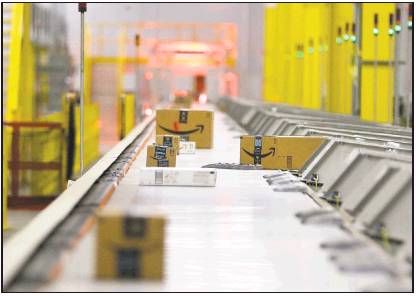With online sales taxes in place, collections drop
By Alexander Soule
Despite new taxes for online purchases in Connecticut, the state’s overall sales tax collections dropped in the first quarter from a year earlier — the first time that has occurred in six years.
Connecticut came up nearly $87 million short of its first-quarter sales tax collections of a year ago, with declines in each of the first three months of 2019 for a combined 7.5 percent drop to $1.07 billion as tracked by the Connecticut Department of Revenue Services.
That nearly wiped out a $97 million gain in Connecticut sales tax collections in December, when DRS began requiring the 600 largest online retailers to charge sales taxes on purchases by Connecticut buyers.
It was not the result envisioned by the Connecticut General Assembly in passing the authorizing law last June for online sales tax collections, after a U.S. Supreme Court decision authorizing states to take that step.
Through the first six months of the state’s fiscal year that started last July, sales tax collections were up 10.3 percent, with the past three months chopping that gain to a mere 3.2 percent.
A DRS spokesperson noted that year-over-year changes in revenue can be influenced by fiscal periods ending on a weekend, with DRS allowing companies to file tax proceeds on the following business day — that could have prompted some companies to delay filing their March sales tax collections until this month.
But DRS did not offer immediate analysis otherwise on any impact of the new online sales tax requirement on lower overall sales tax collections in the first quarter. Multiple companies are offering enabling software to help online companies collect sales taxes, including Norwalk-based TaxCloud.
The DRS rules apply to online retailers that sell at least $250,000 in merchandise or services delivered to Connecticut residences. Amazon has collected taxes on Connecticut purchases since 2013, contributing to an 8.4 percent increase in sales taxes in the first quarter of 2014.
Sales taxes are a major contributor to the Connecticut General Fund, accounting for about a quarter of state revenue the past nine months or nearly $3 billion.
Connecticut charges a 6.35 percent tax on most purchases, the 12 highest rate among states as of January according to the Tax Foundation. The state ranked seventh nationally in annual tax collections on a per capita basis, at about $1,180 for each resident.
In the first months of his administration, Gov. Ned Lamont has focused on sales taxes as one avenue for Connecticut to increase its revenue, with Lamont proposing the state apply sales taxes mostly across the board, with a significant number of service industries able to avoid charging taxes under current law.
Last month in Danbury, Lamont allowed that he expected significant resistance from some of those industries, with his budget chief Melissa McCaw suggesting the same during a mid-March hearing of the revenue committee of the Connecticut General Assembly and saying Lamont had not ruled out an overall increase in sales taxes if his sought-for broadening of the tax base is a dead letter.
“We spent days and weeks ad nauseum looking at the sales tax broadening — the potential impacts on specific industries — and what we found ourselves doing was engaging in a conversation again and again of picking those winners and … losers,” McCaw said. “The governor was very open and honest that if this was not a palatable proposal, he would consider an increase in the sales tax rate.”
Alex.Soule@scni.com; 203-842-2545; @casoulman
